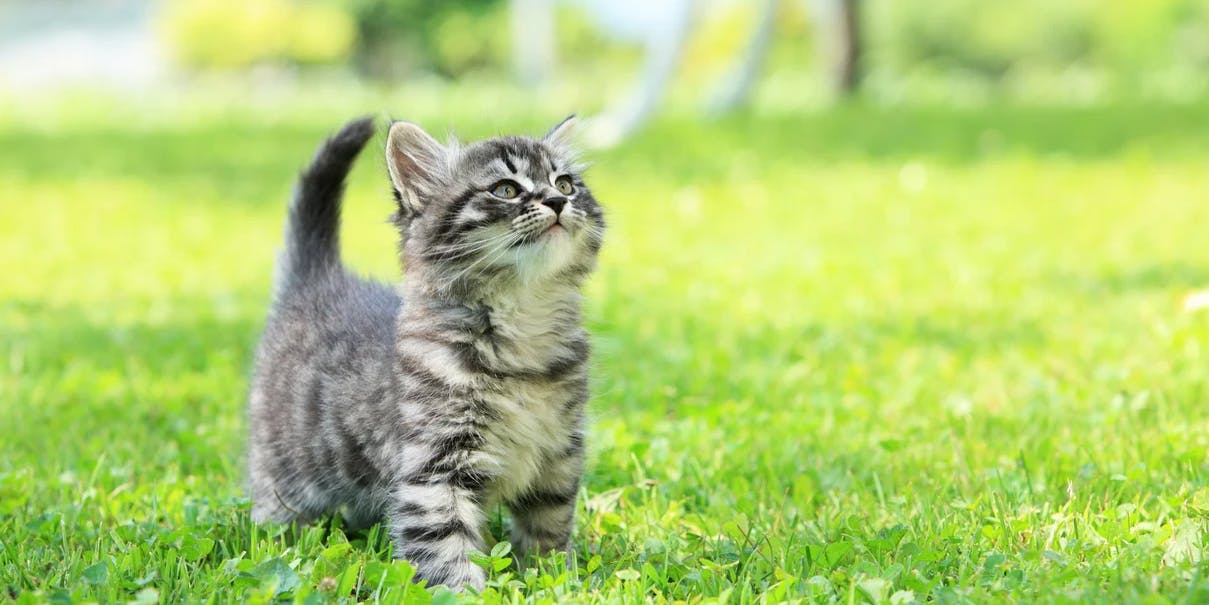
How To Keep Your Cat Safe And Happy Outdoors
Care
General Advice
Health and Wellbeing
Cat
01/05/2023
Throwing your cat outside to fend for itself may cause massive anxiety, and lead to unwanted behaviours such as marking. Letting indoor cats loose in the great outdoors can be a liberating experience for them, but making the change requires careful planning and supervision.
After moving to the countryside our two indoor cats are finally able to enjoy the freedom of the great outdoors. This wasn’t an easy step, as much thought went into ensuring the safety of both our cats and the local wildlife. By taking it slowly and initially allowing them limited outdoor time, our beloved felines made the transition from indoor to outdoor cats with minimum stress or worry.
Inside vs. outside: which is better?
Animal behaviourist Dr Joanne Righetti knows the struggle with the indoor/outdoor cat dilemma all too well. ‘It’s not cruel to keep a cat indoors or in confinement and it may even be worse to force a cat who prefers the indoors to go outside,’ she says. ‘Depending upon what your cat has experienced before, it may either accept new things or find them difficult. In the latter case, the cat will probably choose to spend more time indoors or close to home.’
Dr Stuart Burrough from The Vet Centre in Marlborough highlights some of the problems that can occur if you allow your indoor cat its freedom too quickly, particularly when city dwellers like us move to the country. ‘Quieter country roads can present more of a risk of being run over than a busy city street where there is constant noise and traffic flow,’ he warns. ‘Other risks include poisons such as rat bait, possum traps, farm machinery and farm dogs. Prevention relies upon gradual and supervised introduction so that the cats can become familiar with their surroundings.’
Also, bear in mind that a predominantly indoor cat will not have the experience or knowledge of an outdoor cat. Things like bugs, rain, thunderstorms, cars, and loud noises like planes and trucks can send a sensitive indoor cat running.
Medical checks for your cat before they venture outside
For your cat’s health, before letting it outside you’ll need to keep up a regular worming and flea programme and ensure its vaccinations are current. Desexing your pet will prevent unwanted pregnancies, and reduce wandering and the risk of fights.
Introduce them to the outside world slowly
It is a myth that a cat will always find its way home. A predominantly indoor cat may get lost if it hasn’t mapped its territory, as will a cat that has just recently moved house. ‘The cat may not know its boundaries and the surrounding area, so it may not return home,’ Dr Righetti warns.
Slow introductions to the outside world are essential. Throwing your cat outside to fend for itself may cause massive anxiety, and lead to unwanted behaviours such as marking. ‘Allowing your cat outside may cause a reduced sense of security,’ Dr Burrough says, ‘and this can increase the risk of urine spraying if the territory is threatened, especially if other cats come in through the cat door.’
By ensuring you take your first steps outside slowly, by locking your cat door at night and keeping your cat indoors after dark, these problems can be avoided. ‘Get your cat used to wearing a harness both indoors and in your garden,’ Dr Righetti suggests. ‘Then lead it around the vicinity of your house to allow it to get accustomed to the sights, sounds and scents of your neighbourhood. Watch out for dogs! Eventually you can let the cat out for short spells on his own.’
Our cats, Merlin, a Siamese, and Rupert, an Australian Mist, started off using a cat aviary, and were gradually introduced to ‘lead’ time around the yard. Once we felt confident they knew their area we allowed them supervised outdoor time with a trusty old squirt gun. This taught them to stay around the house, which was sometimes a challenge for our particularly curious Siamese.
Gradually they were able to have more supervised outdoor time. Eventually we didn’t need to supervise them as they created their own boundaries. However, we did catch Merlin at our neighbour’s house 3km away, feasting on their cat’s biscuits! Luckily,, Merlin is super-friendly with all cats, while Rupert never ventures far from the family home and prefers to sniff the air on the patio and find a nice place in the sun. Only feeding them at night encourages my little adventurers to come home before the sun goes down.
Guidelines for feline outside time
Cat aviaries
Several companies build custom-made aviaries that can be used as cat houses. Keep your cat happy by providing branches, climbing posts and a hammock for play and rest. Some new toys will keep your pet interested in its new area.
Walking on a lead
With patience cats can be trained to wear a harness and walk on a lead, which is a great way to ensure they don’t jump over the fence. Get your cat used to wearing a harness during kitten-hood. With older cats, enjoyable experiences, such as having a massage, treats and being outdoors when they have the harness on, can help.
Supervised outside time
Once your cat is used to the lead, allow it to join you for short periods off-lead while you relax in the garden. Keep a water pistol handy, and every time your cat ventures too close to the fence give them a quick squirt. Eventually, you’ll be able to sit back and relax while your cat struts around the invisible boundary. Cats are curious creatures and when given the chance, will extend their own boundaries, so always make sure they wear a collar and tag with your current contact details.
Curfews
Be responsible and keep your cat in at night. Cats are natural hunters and will kill birds and other wildlife, particularly at night and early morning. This is also the time that they are most vulnerable, with the majority of fights and road accidents occurring after dark. By keeping them in, you will reduce their risk of FIV, abscesses and road trauma. Feeding your cat at night and locking the cat door behind them will also prevent other cats from coming in.

Written by The Pet.co.nz
Team
Written by The Pet.co.nz Team
A team of specialists with backgrounds in animal nursing, animal care, and all things pet related.